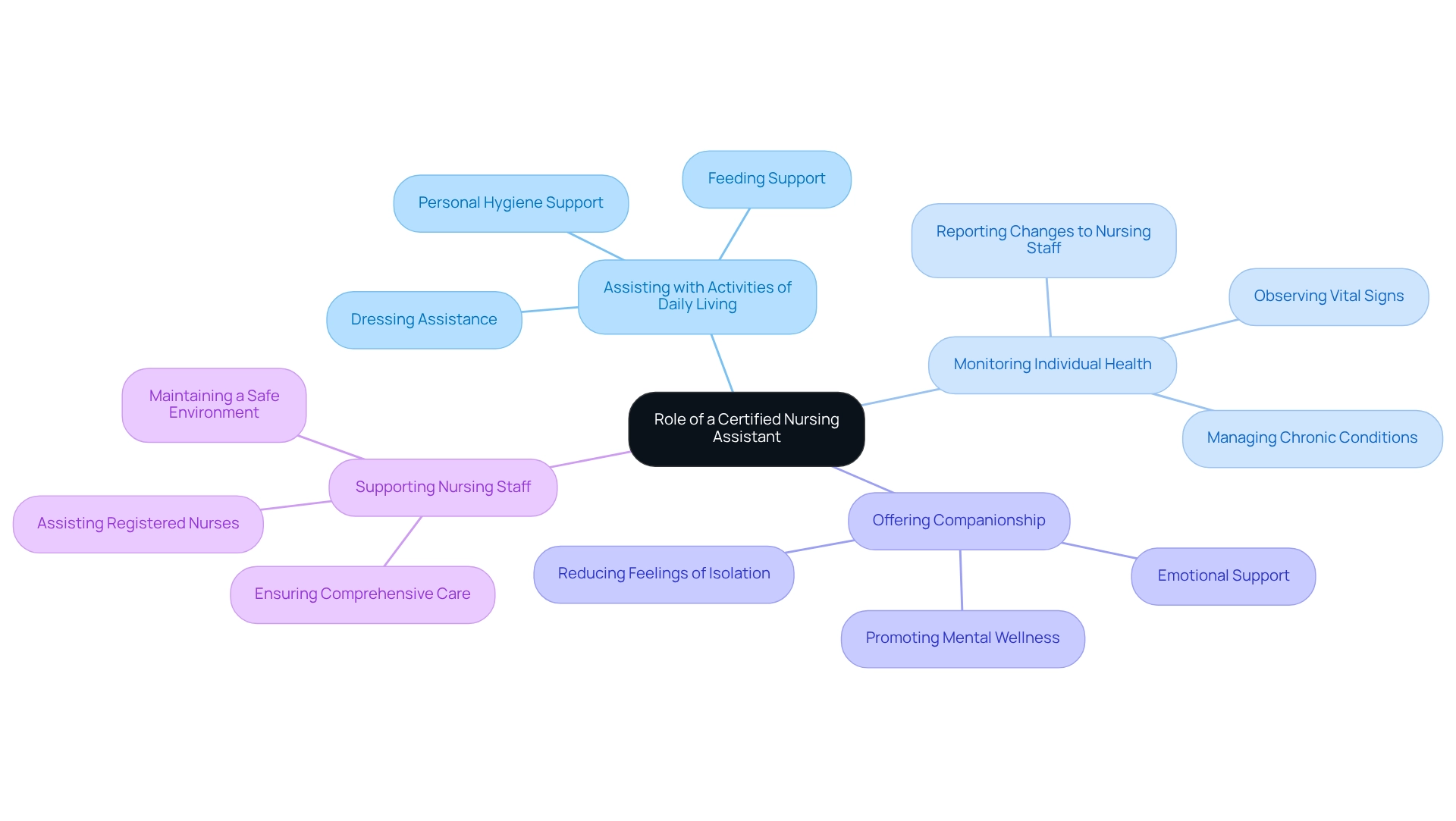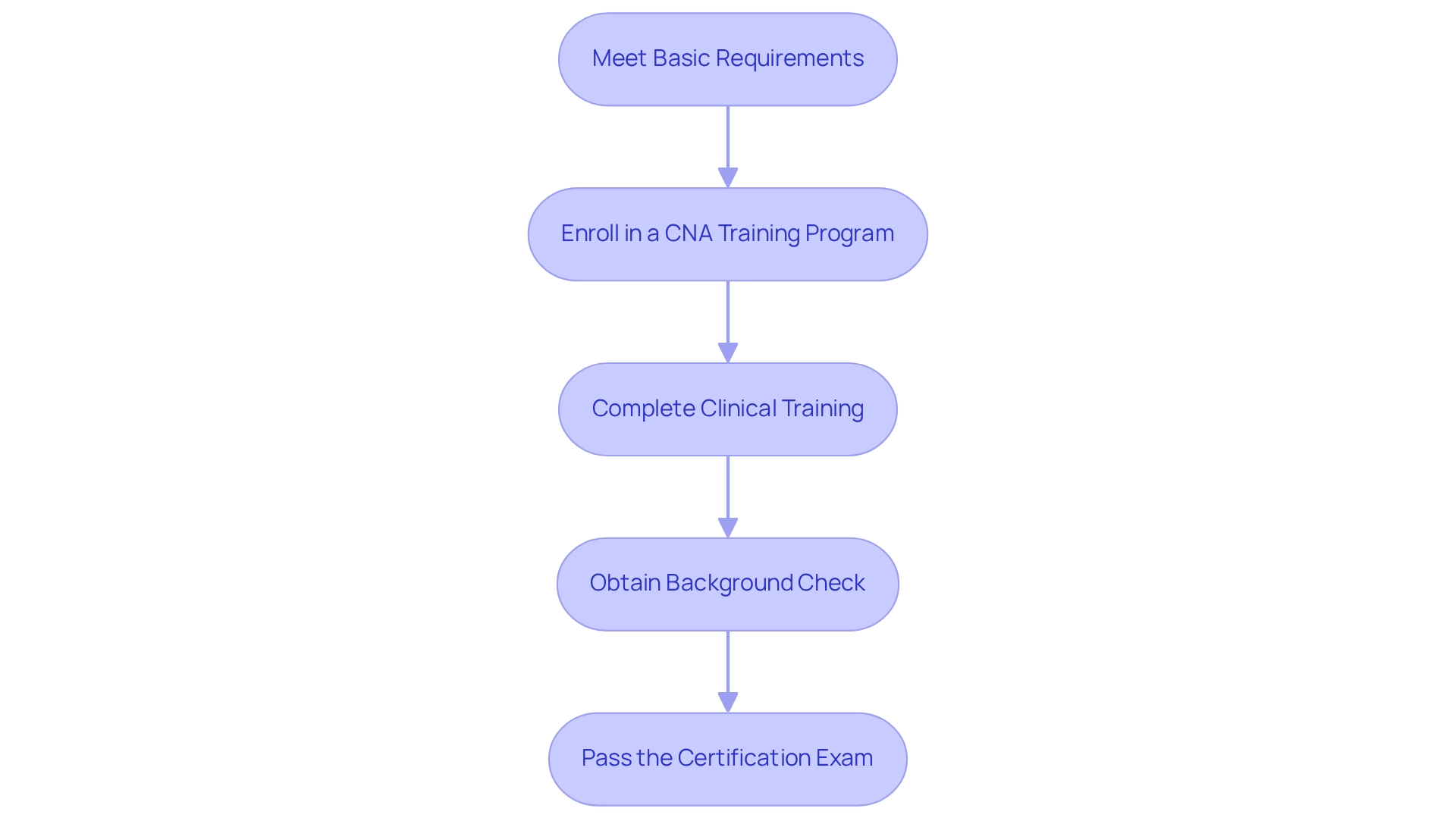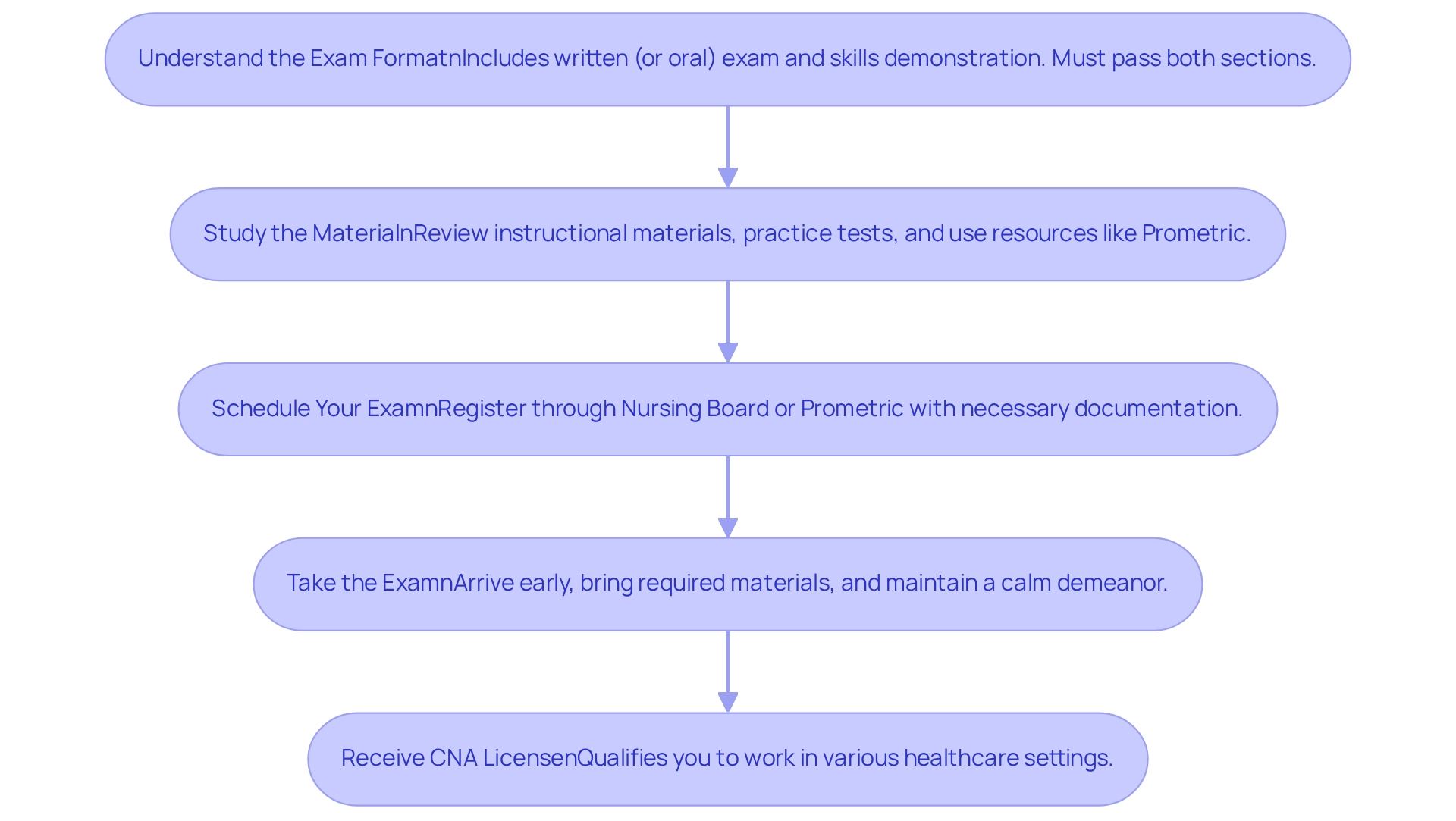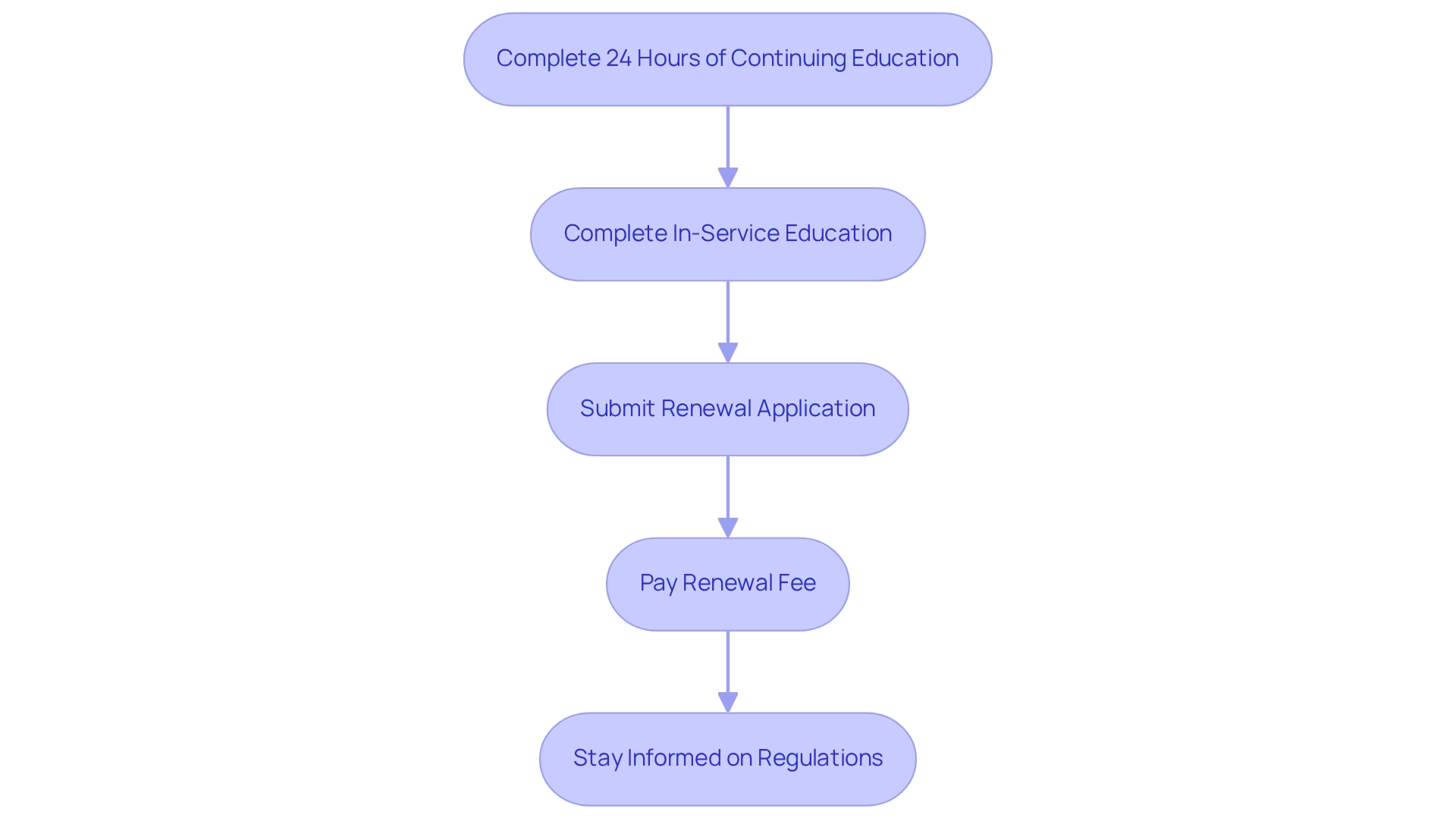Overview
Becoming a Certified Nurse Assistant (CNA) in Florida is a meaningful journey that opens doors to a rewarding career in healthcare. To embark on this path, individuals must complete a state-recognized training program and pass a certification exam. It’s essential to maintain this certification through continuing education, ensuring that you are always equipped to provide the best care possible.
This article highlights the critical steps involved in this process, emphasizing the blend of theoretical knowledge and practical experience. Both are vital in delivering quality care to those in need. As the demand for CNAs continues to grow in the healthcare sector, this profession not only offers job security but also the opportunity to make a real difference in people’s lives.
We understand that the journey may feel overwhelming at times, but remember, you are not alone. Many have walked this path before you, and their experiences can inspire and guide you. As you consider this fulfilling career, know that your comfort and success are our priority. We’re here for you every step of the way.
Introduction
In the ever-evolving landscape of healthcare, Certified Nursing Assistants (CNAs) have become a cornerstone of patient care, providing essential support that enhances the quality of life for those in need. They assist with daily activities, monitor vital signs, and offer emotional companionship, playing a multifaceted role that significantly impacts patient well-being.
As the demand for skilled professionals in this field continues to rise, it is crucial for aspiring caregivers to understand the necessary steps to become a CNA, including:
- Education
- Training
- Certification
- Ongoing professional development
This article delves into the vital responsibilities of CNAs, the pathways to certification, and the importance of maintaining credentials to ensure the highest standards of care in various healthcare settings.
We’re here for you, guiding you through this journey with compassion and support.
Understand the Role and Responsibilities of a Nurse Assistant
As a Certified Nursing Assistant (CNA), you play a vital role in care, with responsibilities that greatly influence the well-being of those you support. Your main responsibilities involve assisting individuals with daily tasks, such as bathing, dressing, grooming, and feeding. Furthermore, nursing assistants are tasked with observing vital signs, assisting with mobility, and providing emotional support to both individuals receiving care and their families. Understanding these key responsibilities is crucial for managing the challenges and benefits of the profession.
- Assisting with Activities of Daily Living (ADLs): This entails offering support for personal hygiene, dressing, and eating, which are essential for upholding an individual’s dignity and comfort. Nursing assistants and home health aides are accessible for hourly services, ensuring that support is tailored to the individual requirements of each client, regardless of age. The adaptability of these services enables families to customize care according to their loved ones’ distinct needs.
- Monitoring Individual Health: Caregivers are often the first to notice changes in an individual’s condition, making precise reporting to nursing staff essential for prompt interventions. This proactive method aids in avoiding health downturns and guarantees that chronic conditions are managed efficiently.
- Offering Companionship: Emotional support is a crucial element of the role, as many individuals encounter feelings of isolation or anxiety. Your presence can significantly improve their emotional wellness, reducing isolation and promoting better mental health.
- Supporting Nursing Staff: Working under the guidance of Registered Nurses (RNs) and Licensed Practical Nurses (LPNs), nursing assistants help in providing comprehensive care, ensuring that all individual needs are met effectively. This partnership is vital for sustaining a secure and orderly living space, which is significant for the overall well-being of seniors.
Comprehending these duties not only prepares you for the training and certification process but also highlights the importance of certified nurse assistants in Florida within the healthcare system. In the state, a considerable proportion of certified nurse assistants in Florida are devoted to aiding with activities of daily living, emphasizing their crucial role in improving individual quality of life. As the Bureau of Labor Statistics projects a 4% growth rate for the certified nurse assistant Florida field through 2033, the demand for skilled professionals in this area continues to rise, reflecting the critical need for compassionate and competent care in various healthcare settings. Additionally, the peace of mind provided to families knowing that a professional caregiver is present can significantly reduce stress and anxiety, allowing them to focus on their own responsibilities. The diverse healthcare settings in which CNAs operate further illustrate the unique responsibilities they face, emphasizing their vital role in supporting patients and ensuring their daily needs are met.

Complete Required Education and Training Programs
To become a certified nurse assistant in Florida, you must complete a state-recognized program. Here are the essential steps to guide you on this rewarding journey:
- Meet Basic Requirements: To be eligible for instruction, you need to hold a high school diploma or GED and be at least 18 years old.
- Enroll in a CNA Training Program: Look for programs accredited by the State Board of Nursing. Typically, these programs consist of 120 hours of preparation, including 80 hours of classroom instruction and 40 hours of clinical practice. Recent statistics show a significant rise in enrollment in certified nurse assistant Florida courses, which reflects an increasing demand for qualified nursing assistants in the healthcare sector.
- Complete Clinical Training: Gaining hands-on experience is crucial. During your clinical education, you will work directly with individuals receiving care under the supervision of experienced healthcare professionals. This experience is vital for developing practical skills. CNAs learn essential medical tasks such as taking vital signs and administering medications, while Home Health Aides (HHAs) focus on personal care and daily living activities. Experts emphasize that clinical training is key to understanding the legal aspects of care, including consent and confidentiality. As families evaluate the need for caregiver services, recognizing signs like difficulty with personal hygiene, dressing, cooking, and managing medications can indicate the necessity for CNA/HHA support.
- Obtain Background Check: Before starting your training, you must undergo a Level 2 background screening to ensure safety in care settings.
These educational requirements are designed to prepare you for the next step: passing the certification exam. With the rising enrollment in certified nurse assistant Florida programs, the demand for qualified nursing assistants continues to grow, creating an opportune moment to embark on a fulfilling career in this sector. As nursing instructors often say, “The practical experience gained during clinical practice is invaluable for aspiring CNAs, as it prepares them for real-world patient interactions.” Regular communication with caregivers and agencies is also essential to ensure quality care for seniors. To take the next step in your journey, consider signing up for a development program today—we’re here to support you every step of the way.

Pass the Certification Exam and Obtain Your License
Successfully passing the CNA certification exam is a crucial step after completing your education as a certified nurse assistant in Florida. We understand that this can be a daunting process, but with effective preparation, you can approach it with confidence. Here’s how to navigate this journey:
- Understand the Exam Format: The certified nurse assistant Florida certification exam includes two essential components: a written (or oral) exam and a skills demonstration. It’s important to know that you must pass both sections to achieve certification.
- Study the Material: Take the time to thoroughly review your instructional materials. Enhance your preparation with additional resources such as practice tests and study guides. Utilizing platforms like Prometric can provide valuable sample questions and exam outlines to help you familiarize yourself with the content.
- Schedule Your Exam: When you feel ready, register for the exam through the Nursing Board or Prometric. Make sure you have all necessary documentation, including proof of training and valid identification, ready for submission.
- Take the Exam: On exam day, arrive early and bring all required materials. Remember to maintain a calm demeanor and focus on clearly demonstrating your skills during the practical portion.
As you prepare, keep in mind that “You’ve already succeeded by showing up prepared.” This mindset can significantly impact your confidence and performance. Once you successfully pass the exam, you will receive your CNA license, which qualifies you as a certified nurse assistant Florida, allowing you to work in various healthcare settings throughout the state, including cities like Miami, Fort Lauderdale, and Boca Raton, where Best Care Nurses Registry operates. With average pass rates reflecting the importance of preparation, aspiring nursing assistants should adopt effective study strategies and seek expert advice to improve their chances of success. Education is a valuable investment in your future, as highlighted in the case study “Education as a Pathway to Success,” which emphasizes the importance of perseverance through challenges. By preparing thoroughly, you can enhance your chances of becoming part of the successful caregivers in the state. Remember, we’re here for you every step of the way.

Maintain Certification Through Continuing Education and Renewal
To maintain your certified nurse assistant Florida certification, it’s essential to adhere to specific requirements that ensure you’re equipped to provide the best care possible, including completing a minimum of 24 hours of continuing education every two years. This instruction should cover vital subjects like infection control, patient rights, and emergency procedures. These topics are crucial for preparing nursing assistants to manage diverse situations in healthcare environments. Did you know that approximately 80% of certified nurse assistants Florida successfully complete their continuing education requirements? This reflects a strong commitment to professional development within our field.
-
In-Service Education: In addition to continuing education, CNAs are required to complete in-service hours. These can be acquired through your employer or authorized educational programs, providing practical, hands-on experience that complements your theoretical knowledge.
-
Renew Your License: It’s crucial to submit your renewal application to the Florida Board of Nursing before your license expires. Make sure you have fulfilled the necessary continuing education and in-service training hours to avoid any lapse in certification. A $5 fee to combat unlicensed activity is assessed upon initial licensure and at each renewal.
-
Stay Informed: Keeping abreast of changes in healthcare regulations and best practices is vital. Attend workshops, webinars, and professional conferences to continuously enhance your knowledge and skills. Remember, it is your responsibility to meet all requirements, as license renewal information is subject to change.
In addition to maintaining your certification, consider whether your elderly relatives may require CNA/HHA caregiver services. Indicators such as difficulty with personal hygiene, dressing, cooking, cleaning, or managing medications can suggest the need for assistance. Regular communication with caregivers and home care agencies is essential to ensure quality care. By fulfilling these requirements and understanding the signs that indicate a need for caregiver services, you will keep your certified nurse assistant Florida certification active, which allows you to provide the highest quality of care to your patients. We’re here for you in this journey, ensuring that both you and your loved ones receive the care and support you deserve.

Conclusion
The journey to becoming a Certified Nursing Assistant (CNA) is not only rewarding but also essential in the healthcare landscape. Understanding the role and responsibilities of a CNA lays a strong foundation for effective patient care. It highlights the importance of assisting with daily activities, monitoring health, providing companionship, and supporting nursing staff. This multifaceted role underscores how CNAs significantly enhance the quality of life for patients and their families.
Completing the necessary education and training programs is a critical step that prepares aspiring CNAs for the certification exam. By meeting the basic requirements, enrolling in accredited programs, and gaining hands-on experience, individuals can build the skills needed to excel in this compassionate profession. Successfully passing the certification exam opens doors to various healthcare settings where compassionate care is in high demand.
Maintaining certification through ongoing education and renewal is vital for professional growth and ensuring the highest standards of care. By committing to continued learning and staying informed about industry changes, CNAs can enhance their skills and adapt to evolving patient needs. This dedication not only benefits the caregivers themselves but also profoundly impacts the lives of those they serve.
In summary, the role of a CNA is indispensable in today’s healthcare system. By embracing responsibilities, pursuing the required education, and committing to lifelong learning, aspiring CNAs can truly make a meaningful difference in the lives of their patients. Together, we can ensure that quality care remains at the forefront of this noble profession.
Frequently Asked Questions
What are the main responsibilities of a Certified Nursing Assistant (CNA)?
CNAs are responsible for assisting individuals with daily tasks such as bathing, dressing, grooming, and feeding. They also monitor vital signs, assist with mobility, and provide emotional support to individuals and their families.
How do CNAs assist with Activities of Daily Living (ADLs)?
CNAs support personal hygiene, dressing, and eating, which are essential for maintaining an individual’s dignity and comfort. They provide hourly services tailored to the unique needs of each client, regardless of age.
Why is monitoring individual health important for CNAs?
CNAs are often the first to notice changes in an individual’s condition, making accurate reporting to nursing staff crucial for timely interventions. This proactive approach helps prevent health downturns and ensures effective management of chronic conditions.
In what ways do CNAs provide emotional support?
CNAs offer companionship, which is vital for individuals who may feel isolated or anxious. Their presence can significantly enhance emotional wellness, reducing feelings of isolation and promoting better mental health.
How do CNAs support nursing staff?
CNAs work under the guidance of Registered Nurses (RNs) and Licensed Practical Nurses (LPNs) to provide comprehensive care, ensuring that all individual needs are met effectively, thereby contributing to a secure and orderly living environment.
What is the significance of CNAs in Florida’s healthcare system?
CNAs play a crucial role in improving individual quality of life by assisting with daily living activities. The demand for skilled CNAs in Florida is projected to grow by 4% through 2033, reflecting the ongoing need for compassionate care in various healthcare settings.
How does having a professional caregiver benefit families?
The presence of a professional caregiver, such as a CNA, provides peace of mind to families, reducing their stress and anxiety, and allowing them to focus on their own responsibilities.








